- Barajar
ActivarDesactivar
- Alphabetizar
ActivarDesactivar
- Frente Primero
ActivarDesactivar
- Ambos lados
ActivarDesactivar
- Leer
ActivarDesactivar
Leyendo...
Cómo estudiar sus tarjetas
Teclas de Derecha/Izquierda: Navegar entre tarjetas.tecla derechatecla izquierda
Teclas Arriba/Abajo: Colvea la carta entre frente y dorso.tecla abajotecla arriba
Tecla H: Muestra pista (3er lado).tecla h
Tecla N: Lea el texto en voz.tecla n
![]()
Boton play
![]()
Boton play
![]()
3 Cartas en este set
- Frente
- Atrás
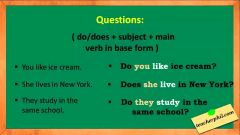
There are two tenses in English – past and present.
The present tenses in English are used: to talk about the present to talk about the future |
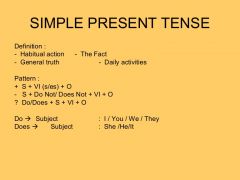
We use these forms:
to talk about the present: He works at McDonald’s. He has worked there for three months now. He is working at McDonald’s. He has been working there for three months now. London is the capital of Britain. |
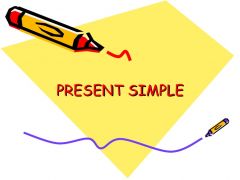
For repeated or regular actions in the present time period.
I take the train to the office. The train to Berlin leaves every hour. John sleeps eight hours every night during the week. |

We form the present tense using the base form of the infinitive (without the TO).
In general, in the third person we add 'S' in the third person. Subject Verb The Rest of the sentence I / you / we / they speak / learn English at home he / she / it speaks / learns English at home |
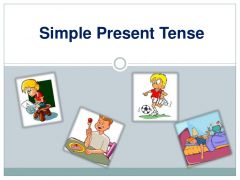
For facts.
The President of The USA lives in The White House. A dog has four legs. We come from Switzerland. |
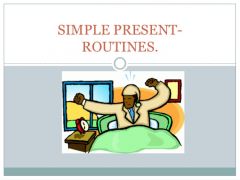
For habits.
I get up early every day. Carol brushes her teeth twice a day. They travel to their country house every weekend. |